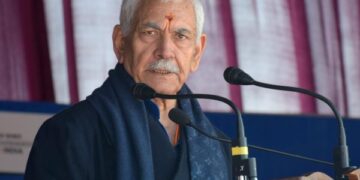Srinagar, Apr 8: The High Court of J&K and Ladakh on Tuesday stayed the operation of a notice by the Central GST Commissionerate, demanding Rs 16,200 crores as GST from the Jammu & Kashmir Bank.
The bank in February this year had received a demand from the Joint Commissioner, Central GST Commissionerate, Jammu, for GST liability of Rs 81,30,66,42,768 and almost an equal amount of interest and penalty by the Central taxation agency.
The demand notice pertained to the period from July 8, 2017 to March 31, 2020, for transfers under the bank’s Transfer Price Mechanism (TPM). The tax department had raised the demand saying that interest receivables under TPM between the corporate headquarters and branches of the bank from the common pool of funds is of financial services and attracts GST.
The bank’s shares had subsequently tumbled by over two percent after the notice.
The bank holds that the notice has no legal justification and challenged it in the High Court pleading that slapping it with GST will lead to the collapse of the bank.
Justices Rajnesh Oswal and M Y Wani after hearing the writ petition by the bank ordered “subject to objections from other side, the operation of the orders impugned in this petition shall remain stayed”.
The petitioner says that it is a banking company with corporate headquarter (Head Office) and has business units (branches) at different places within and outside Jammu and Kashmir for the purposes of carrying out banking business. The petitioner with its branches is registered under Central Goods and Services Tax Act and J&K Goods and Services Tax Act as a single entity.
It contends that money itself is excluded from the definition of goods and services in the Goods and Services Act and hence not liable to any tax. However, activities relating to use of money or its conversion, for which a separate consideration is charged, is a service.
However, the interest earned by extending deposits, loans or advances in so for consideration of interest is specifically exempted from tax, charging “nil” tax.
Whatever funds are transferred between different business units of the bank, are purely money transactions involving no financial services. It being so, coupled with the fact that interest is otherwise exempted from tax, the petitioner had filed its returns from time to time and shown ‘nil’ liability in respect of interest retained by it qua funds transferred to or received from branches, it said.
The respondents including Union of India especially the No. 6 (Joint Commissioner, Central GST Commissionerate, Jammu) has totally misdirected himself, said the petition. It has treated transfer of funds by the petitioner bank to its business units in the course of its business as a service to a separate entity and proceeded to identify the interest retained by it a service charge and consequently fastened liability on the petitioner bank even though corporate headquarters and its business units constitute one entity and is registered as a one entity with the respondents, it added.
The petition reads “J&K Bank is the only bank in the country which is exposed to such a type of tax on transfer of funds to its business units. If it is allowed, the very bank would collapse. Besides, since GST is to be passed on to customers, it will render fixation of interest rate by the Reserve Bank totally impossible”.
It maintained that the orders passed by respondent No. 6 are totally preposterous, based on misdirection of law and without jurisdiction.
The core activities of the petitioner, like that of any other banking company, are acceptance of deposits from depositors and lending money to borrowers through the network of its branches, which are extensions, the limbs, of the petitioner bank and in essence part and parcel of the bank. The existence of a bank cannot be conceived of in the modern world without its branches. The corporate headquarters of the bank together with its branches constitute a single legal entity and is registered as such with the Reserve Bank of India, read the petition.
It said that the interest is paid to depositors whereas interest is charged from the borrowers through the branches and the difference in the two results in the profit or the loss of the branch. The income, profit and profit of the petitioner bank is determined after consolidating the balance sheet of all branches. The profit and loss of any particular branch is of no consequence as the bank is seen as a combination of its branches.
“The deposits mobilized by the branches are transferred to a common pool of funds managed by the corporate head-office of the bank. Out of the common fool of funds money is made available to borrowers through a network of branches to enable the branches concerned to make advances and earn interest therefrom,” continued the petition.
It says that in the course of business, it is possible, and it usually happens, that at a particular time a particular branch may have more deposits for which interest is paid and less advances from which interest could be earned. It is for this reason that funds received are transferred to a common pool of funds managed at the corporate head-office.
The interest earned, it said, is distributed between branches and head office through an internal pricing system, referred to as Fund Transfer Price Mechanism (TPM). The important function of TPM is to provide a basis for exchange of funds between business units of a bank. It is actually an internal allocation and measurement mechanism used for determining the pricing of incremental loans and deposits and for determining the profit contribution of various lending and borrowing units of a bank. It is a means to identify the areas of strength and weaknesses within the bank.
The matter has been posted for further proceedings on May 7, 2025.








